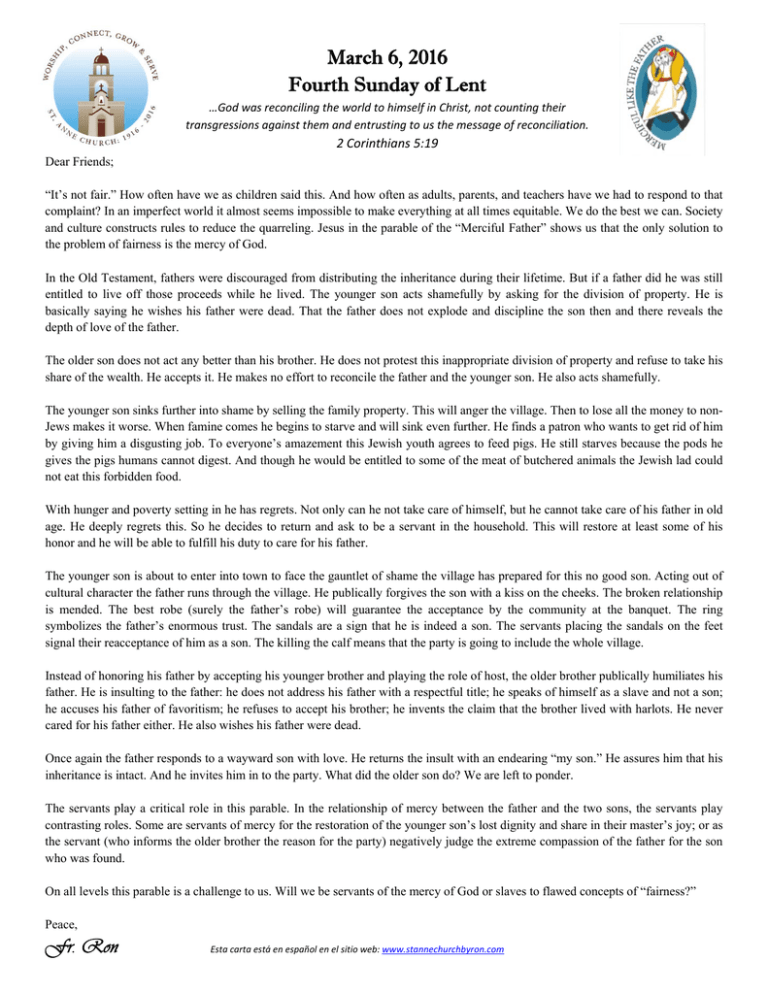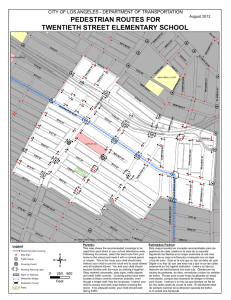March 6, 2016 Fourth Sunday of Lent Fr. Ron
Anuncio

March 6, 2016 Fourth Sunday of Lent …God was reconciling the world to himself in Christ, not counting their transgressions against them and entrusting to us the message of reconciliation. 2 Corinthians 5:19 Dear Friends; “It’s not fair.” How often have we as children said this. And how often as adults, parents, and teachers have we had to respond to that complaint? In an imperfect world it almost seems impossible to make everything at all times equitable. We do the best we can. Society and culture constructs rules to reduce the quarreling. Jesus in the parable of the “Merciful Father” shows us that the only solution to the problem of fairness is the mercy of God. In the Old Testament, fathers were discouraged from distributing the inheritance during their lifetime. But if a father did he was still entitled to live off those proceeds while he lived. The younger son acts shamefully by asking for the division of property. He is basically saying he wishes his father were dead. That the father does not explode and discipline the son then and there reveals the depth of love of the father. The older son does not act any better than his brother. He does not protest this inappropriate division of property and refuse to take his share of the wealth. He accepts it. He makes no effort to reconcile the father and the younger son. He also acts shamefully. The younger son sinks further into shame by selling the family property. This will anger the village. Then to lose all the money to nonJews makes it worse. When famine comes he begins to starve and will sink even further. He finds a patron who wants to get rid of him by giving him a disgusting job. To everyone’s amazement this Jewish youth agrees to feed pigs. He still starves because the pods he gives the pigs humans cannot digest. And though he would be entitled to some of the meat of butchered animals the Jewish lad could not eat this forbidden food. With hunger and poverty setting in he has regrets. Not only can he not take care of himself, but he cannot take care of his father in old age. He deeply regrets this. So he decides to return and ask to be a servant in the household. This will restore at least some of his honor and he will be able to fulfill his duty to care for his father. The younger son is about to enter into town to face the gauntlet of shame the village has prepared for this no good son. Acting out of cultural character the father runs through the village. He publically forgives the son with a kiss on the cheeks. The broken relationship is mended. The best robe (surely the father’s robe) will guarantee the acceptance by the community at the banquet. The ring symbolizes the father’s enormous trust. The sandals are a sign that he is indeed a son. The servants placing the sandals on the feet signal their reacceptance of him as a son. The killing the calf means that the party is going to include the whole village. Instead of honoring his father by accepting his younger brother and playing the role of host, the older brother publically humiliates his father. He is insulting to the father: he does not address his father with a respectful title; he speaks of himself as a slave and not a son; he accuses his father of favoritism; he refuses to accept his brother; he invents the claim that the brother lived with harlots. He never cared for his father either. He also wishes his father were dead. Once again the father responds to a wayward son with love. He returns the insult with an endearing “my son.” He assures him that his inheritance is intact. And he invites him in to the party. What did the older son do? We are left to ponder. The servants play a critical role in this parable. In the relationship of mercy between the father and the two sons, the servants play contrasting roles. Some are servants of mercy for the restoration of the younger son’s lost dignity and share in their master’s joy; or as the servant (who informs the older brother the reason for the party) negatively judge the extreme compassion of the father for the son who was found. On all levels this parable is a challenge to us. Will we be servants of the mercy of God or slaves to flawed concepts of “fairness?” Peace, Fr. Ron Esta carta está en español en el sitio web: www.stannechurchbyron.com 6 de Marzo, 2016 Cuarto Domingo de Cuaresma … Dios estaba reconciliando al mundo consigo en Cristo, no contando sus transgresiones contra ellos y confiando a nosotros el mensaje de reconciliación. 2 Corintios 5:19 Queridos Amigos; “No es justo". Con qué frecuencia hemos dicho esto de niños. Y con qué frecuencia como adultos, padres y maestros hemos tenido que responder a esa queja? En un mundo imperfecto, parece casi imposible hacer todo en todo momento equitativo. Hacemos lo mejor que podemos. La sociedad y la cultura construyen reglas para reducir las peleas. Jesús en la parábola del "Padre misericordioso" nos enseña que la única solución al problema de la equidad es la misericordia de Dios. En el Antiguo Testamento, Los padres eran desalentados de distribuir la herencia en tiempo de vida. Pero si un padre lo hacía aun tenía derecho a vivir de esos ingresos mientras vivía. El hijo más joven actúa vergonzosamente pidiendo la división de la propiedad. Básicamente está diciendo que desea que su padre esté muerto. Que el padre no explote y discipline al hijo allí mismo revela la profundidad del amor del padre. El hijo mayor no actúa mejor que su hermano. No protesta esta división inadecuada de propiedad y se niegan a asumir su parte de la riqueza. Él lo acepta. No hace ningún esfuerzo por reconciliar el padre con el hijo más joven. El también actúa vergonzosamente. El hijo más joven se hunde aún más en vergüenza por la venta de la propiedad de la familia. Esto traería la ira de la aldea. Entonces, el perder todo el dinero a los no-judíos, es peor. Cuando viene la hambruna comienza a morir de hambre y se hunde aún más. Encuentra a un patrón que quiere deshacerse de él, dándole un trabajo asqueroso. Para sorpresa de todos este joven judío acepta alimentar cerdos. Aun se priva porque las vainas que le da a los cerdos no pueden ser digerir por humanos. Y aunque él tendría derecho a parte de la carne de los animales masacrados, el muchacho judío no podía comer este alimento prohibido. Con tal pobreza y hambre, él joven comienza a tener remordimientos. No solo no ha podido cuidar de sí mismo, pero no puede cuidar de su padre en la vejez. Él lamenta esto profundamente. Así que él decide volver y pedir ser un siervo en la casa. Esto devolverá al menos su honor y será capaz de cumplir con su deber de atender a su padre. El hijo más joven esta a punto de entrar a la ciudad para enfrentar el gran reto de vergüenza que pueblo ha preparado para esto hijo bueno para nada. Actuando fuera de el carácter cultural, el padre corre por el pueblo. Perdona públicamente al hijo con un beso en las mejillas. La relación rota está reparada. El mejor traje (seguramente pertenecía al padre) le garantiza la aceptación por la comunidad en el banquete. El anillo simboliza la confianza enorme del padre. Las sandalias son una señal de que él es un buen hijo. Los sirvientes colocando las sandalias en sus pies son la señal de su reaceptación como hijo. La matanza de los terneros significa que la fiesta va a incluir a todo el pueblo. En lugar de honrar a su padre aceptando a su hermano menor y hacienda el papel de anfitrión, el hermano mas grande humilla públicamente a su padre. Él es un insulto al padre: él no responde a su padre con un título respetuoso; él habla de sí mismo como un esclavo y no un hijo; acusa a su padre de favoritismo; él se niega a aceptar a su hermano; inventa la afirmación de que el hermano vivió con rameras. Él nunca cuidó de su padre tampoco. También desea que su padre estuviera muerto. Una vez más el padre responde a un hijo pródigo con amor. Él le devuelve el insulto con un entrañable a "mi hijo". Él le asegura que su herencia está intacta. Y le invita a la fiesta. ¿Qué hizo el hijo mayor? Sólo nos queda reflexionar. Los siervos tienen un papel fundamental en esta parábola. En la relación de misericordia entre el padre y los dos hijos, los sirvientes tienen papeles contrastantes. Algunos son siervos de la misericordia para la restauración de la dignidad perdida del hijo más joven y compartan en la alegría de su amo; o como el siervo (que informa el hermano mayor el motivo de la fiesta) juzgan negativamente la extrema compasión del padre por el hijo que fue encontrado. En todos los niveles de esta parábola es un desafío para nosotros. ¿Seremos siervos de la misericordia de Dios o esclavos a conceptos erróneos de "justicia"? Paz, Fr. Ron Esta carta está en español en el sitio web: www.stannechurchbyron.com

